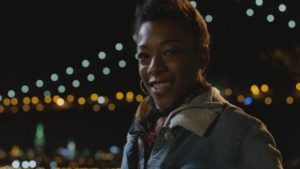During the searing last two episodes of Season Four of Orange is the New Black, the prison explodes in violence. By the end, an inmate is dead, and the one person we want to be the hero, to save everyone including himself, fails with such spectacular impact that it’s almost as beautiful as it is destructive.
Poussey, her gamine, whimsical, beautiful, lovely romantic self, lies dead, after gasping, “I can’t breathe.”
And fucking Warden Caputo lets everyone down. Again. And again. And again.
If Game of Thrones fans say of the violence depicted on that show that’s how things were, back in “those days,” OITNB takes an unflinching look at how real violence in “these days” impacts real people. How the myth of the good guy is so powerful that good guys believe it. How words have power to incite race hatred, even if they are accidental words.
But what OITNB has the courage to acknowledge that GoT does not, is that violence is not spectacle, even when we watch it from the comfort from our living rooms, and that should break our hearts.
Caputo fails because he believes he’s one of the good guys, even though he keeps Sophia Burset in solitary, lying to her and her wife and her allies, even though he takes the photo that gets her out, even though he once again tries to serve two masters, his self image and MCC, even though he leaves Poussey’s body lying in the cafeteria, even though he only at the last minute calls her father to tell her she is dead. Caputo never once lives up to his own laser-like focus on his own goodness, even when he holds the press conference absolving the guard who killed Poussey, thinking he is taking a bold stand against his corporate overlords. Caputo’s words incite the riot that ends the season, with sweet inmate Daya holding a gun on a rotten, evil guard.
Sam Healy, of all characters, has the only singular moment of self-realization, when he calls his Russian wife and says, “I am not very good at my job.”
It is hilarious because it’s true. He’s got a power-tripping white savior complex, and in that moment, when he realizes just how bad he is at his job, like the worst prison social worker ever in the history of the field, all anyone can do is laugh til tears come, and not the cathartic ones.
So, Poussey. The show is known for its structural flashbacks that tell us how the inmates and the guards got to prison. So the last we see of Poussey, we think we are seeing that flashback. She’s traveling in Brooklyn and she’s trying to meet up with her friends.
Only gradually does the truth come clear. This is Poussey’s final voyage. She never finds her friends, and her entire journey is one of missed connections. She literally goes underground on the subway. She has lost her way, her phone is stolen, she meets strange and wondrous creatures, and has shared moments of companionship and bonding. At the very end, she is transported on the handlebars of a bicycle pedaled by a fake monk, to the ends of the earth, or at least the waters of the Hudson River.
There, Poussey turns to face the camera and smiles. I’ve taken you as far as I can, she seems to say. Here I go on alone. You can go no farther.


0 Comments